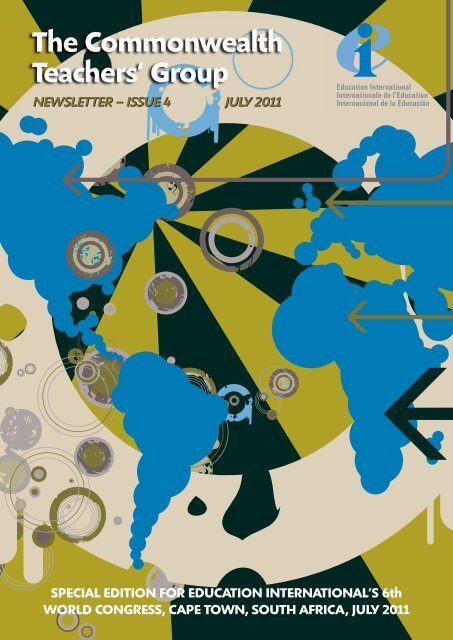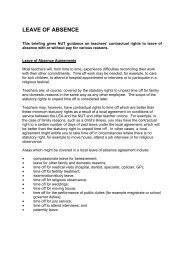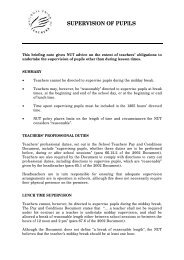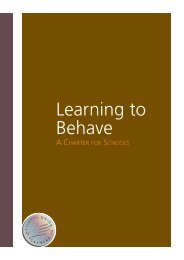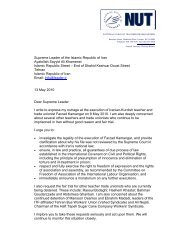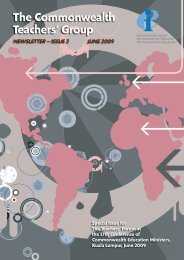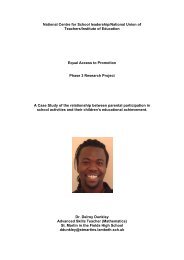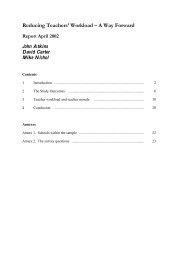The Commonwealth Teachers' Group NEWSLETTER
The Commonwealth Teachers' Group NEWSLETTER
The Commonwealth Teachers' Group NEWSLETTER
Create successful ePaper yourself
Turn your PDF publications into a flip-book with our unique Google optimized e-Paper software.
<strong>The</strong> <strong>Commonwealth</strong><br />
Teachers’ <strong>Group</strong><br />
<strong>NEWSLETTER</strong> – ISSUE 4 JULY 2011<br />
SPECIAL EDITION FOR EDUCATION INTERNATIONAL’S 6th<br />
WORLD CONGRESS, CAPE TOWN, SOUTH AFRICA, JULY 2011
Foreword<br />
Welcome to the fourth issue of the <strong>Commonwealth</strong> Teachers’ <strong>Group</strong> (CTG) newsletter.<br />
This newsletter is your chance to catch up on the recent work of the CTG Co-ordinating<br />
Committee. It also focuses on key issues affecting teachers and education across the<br />
<strong>Commonwealth</strong>.<br />
This year elections are being held for a new CTG Co-ordinating Committee at the<br />
Education International (EI) World Congress in Cape Town. <strong>The</strong> CTG will also hold a<br />
convention of all EI affiliates from <strong>Commonwealth</strong> countries attending the EI Congress.<br />
We hope to see you or your representatives there!<br />
This remains a particularly challenging time for teachers’ organisations worldwide, as we<br />
fight the continuing economic pressure on already strained education budgets and<br />
priorities. <strong>The</strong> reform agenda in education presents us all with challenges as well as<br />
opportunities. <strong>The</strong> CTG Co-ordinating Committee has been working in support of<br />
quality education for all, on issues concerning the privatisation of education, the use of<br />
unqualified teachers and teacher migration.<br />
In this newsletter we have articles from Nigeria, Australia and the UK. We also have a<br />
report on the second meeting of the <strong>Commonwealth</strong> Advisory Council on Teacher<br />
Mobility, Recruitment and Migration.<br />
We are also pleased to report on the experiences of those who attended the<br />
<strong>Commonwealth</strong> Teachers’ Forum held at the 17th Conference of <strong>Commonwealth</strong><br />
Education Ministers in 2009 and the benefits gained from the <strong>Commonwealth</strong> Teachers’<br />
Forum Statement, drafted by 29 unions from across the <strong>Commonwealth</strong>, at the event.<br />
Working together across the <strong>Commonwealth</strong> has been vital to strengthening our work,<br />
providing a strong base from which we can influence governments, and support and<br />
learn from each other.<br />
I hope you enjoy reading this issue. Please let us know what you think and send any<br />
suggestions for future editions to ctg@nut.org.uk.<br />
CHRISTINE BLOWER<br />
Acting Convenor, <strong>Commonwealth</strong> Teachers’ <strong>Group</strong><br />
General Secretary, National Union of Teachers, UK
<strong>The</strong> CTG Elections and<br />
Convention at 2011<br />
EI World Congress<br />
Dennis Sinyolo, Senior Education Co-ordinator EI, has<br />
been appointed as Returning Officer for the CTG Coordinating<br />
Committee elections taking place at the<br />
2011 EI World Congress. <strong>The</strong> four CTG Regional Coordinators,<br />
or their representatives, will support<br />
Dennis as observers.<br />
<strong>The</strong> business of the CTG is conducted by the<br />
Co-ordinating Committee made up of one person<br />
elected from each EI region in the <strong>Commonwealth</strong>. In<br />
addition there are five generally elected members,<br />
elected by all EI officials in <strong>Commonwealth</strong> countries.<br />
A Convention of the CTG will also be held at<br />
Congress, on Sunday, 24th July, from 2.30pm to 6pm.<br />
For more information and the agenda for the CTG<br />
meeting at EI World Congress go to<br />
http://www.ei-ie.org/congress6/en/<br />
<strong>Commonwealth</strong> Teachers’ Forum 2012<br />
<strong>The</strong> next <strong>Commonwealth</strong> Teachers’ Forum will take<br />
place in Mauritius in 2012 during the 18th Conference<br />
of <strong>Commonwealth</strong> Education Ministers from 27 – 31<br />
August. <strong>The</strong> Teachers’ Forum is open to all teachers<br />
and their organisations from <strong>Commonwealth</strong><br />
countries.<br />
<strong>The</strong> Forum will include keynote speakers who are<br />
education experts and will provide a unique<br />
opportunity for participants to share experiences and<br />
discuss challenges facing education across the<br />
<strong>Commonwealth</strong>. Moreover this is a meeting which<br />
enables us to work together to influence the policy<br />
and thinking of <strong>Commonwealth</strong> governments.<br />
<strong>The</strong> CTG Co-ordinating Committee, which organises<br />
the Forum in collaboration with the <strong>Commonwealth</strong><br />
Secretariat and the host government, will be<br />
contacting all CTG members about the Forum, in<br />
particular encouraging unions to approach their<br />
governments to seek financial support for their<br />
participation.<br />
17CCEM ceremony in Kuala Lumpur, Malaysia, June 2009<br />
3
Steve Sinnott Award for<br />
<strong>Commonwealth</strong> Teachers<br />
<strong>The</strong> next Steve Sinnott Award for the Professional<br />
Development of Teachers will be judged and<br />
presented in 2012, as one of the <strong>Commonwealth</strong><br />
Education Good Practice Awards. Launched in April<br />
2011, the Awards will culminate at the 18CCEM in<br />
Mauritius in August 2012, and the finalists will be<br />
invited to attend.<br />
<strong>The</strong> <strong>Commonwealth</strong> Education Good Practice Awards<br />
highlight good practice in education throughout the<br />
<strong>Commonwealth</strong> according to six action areas:<br />
● achieving universal primary education;<br />
● eliminating gender disparities in education;<br />
● improving quality in education;<br />
● using distance learning to overcome barriers;<br />
● supporting education in difficult circumstances; and<br />
● mitigating the impact of HIV/AIDS on education<br />
systems.<br />
Submissions must be received by 30 November 2011.<br />
To apply, download and complete the application form<br />
at http://www.thecommonwealth.org/education<br />
Completed forms must be sent by e-mail or post,<br />
addressed to:<br />
<strong>The</strong> Co-ordinator<br />
<strong>Commonwealth</strong> Education Good Practice Awards<br />
Education Section<br />
Social Transformation Programmes Division<br />
<strong>Commonwealth</strong> Secretariat<br />
Marlborough House<br />
Pall Mall<br />
London SW1Y 5HX<br />
UK<br />
E-mail: educationawards@commonwealth.int<br />
Members of the <strong>Commonwealth</strong> Teachers’ <strong>Group</strong> are<br />
strongly encouraged to apply.<br />
Steve Sinnott Award for <strong>Commonwealth</strong> Teachers Ceremony, June 2009.<br />
Pic: Amy Norrish<br />
4
Meeting of the<br />
<strong>Commonwealth</strong> Advisory<br />
Council on Teacher Mobility,<br />
Recruitment and Migration<br />
By Samidha Garg, National Union of Teachers, UK<br />
COMMONWEALTH<br />
TEACHER RECRUITMENT<br />
PROTOCOL<br />
ADOPTED BY MINISTERS OF EDUCATION<br />
AT STOKE ROCHFORD HALL<br />
CONFERENCE CENTRE<br />
LINCOLNSHIRE, UNITED KINGDOM<br />
SEPTEMBER 1ST, 2004<br />
<strong>The</strong> second meeting of the <strong>Commonwealth</strong> Advisory<br />
Council on Teacher Mobility, Recruitment and<br />
Migration took place this year in June at Stoke<br />
Rochford, Lincolnshire, UK. <strong>The</strong> Advisory Council<br />
considered progress against the twelve action points<br />
contained in the Statement of the Inaugural Meeting<br />
of the Advisory Council in 2010. <strong>The</strong> Advisory<br />
Council also gave consideration to evidence provided<br />
by Country Focal Points on the implementation of<br />
the <strong>Commonwealth</strong> Teacher Recruitment Protocol.<br />
Information was provided on a proposed<br />
<strong>Commonwealth</strong> Connects web portal as well as<br />
creating Implementation Guidelines for the<br />
<strong>Commonwealth</strong> Teacher Recruitment Protocol.<br />
COMMONWEALTH SECRETARIAT<br />
in conjunction with<br />
<strong>The</strong> <strong>Commonwealth</strong><br />
Teachers’<br />
<strong>Group</strong><br />
At its conclusion, the Meeting Statement emphasised<br />
the importance of continuing to raise awareness of<br />
the Protocol and mandated the <strong>Commonwealth</strong><br />
Secretariat to carry out a number of action points<br />
in working towards the implementation of the<br />
Protocol.<br />
<strong>The</strong> CTG was represented by its Acting Convenor,<br />
Christine Blower, at the Advisory Council<br />
meeting.<br />
<strong>Commonwealth</strong> Research Symposium<br />
By Samidha Garg, National Union of Teachers, UK<br />
<strong>The</strong> fourth <strong>Commonwealth</strong> Research Symposium was held in Ethiopia in June 2011, with a strong presence<br />
from the <strong>Commonwealth</strong> Teachers’ <strong>Group</strong> and Education International. <strong>The</strong> overall objective was to share<br />
research on issues affecting<br />
teacher migration so that<br />
policy makers are equipped<br />
with the latest evidence to<br />
guide them. Specific<br />
objectives were to:<br />
● raise awareness of the<br />
<strong>Commonwealth</strong> Teacher<br />
Recruitment Protocol,<br />
improving the scope and<br />
penetration of its<br />
implementation; and<br />
● share learning about<br />
implementation which<br />
will assist the African<br />
Union and any other<br />
interested bodies in<br />
developing protocols on<br />
teacher migration.<br />
Delegates at the <strong>Commonwealth</strong> Research Symposium, Addis Ababa, Ethiopia,<br />
June 2011.<br />
Pic: Dr Casmir Chanda<br />
5
Improving education aid<br />
A new coalition links Australian Education Union (AEU)<br />
members more directly with the Global Campaign for<br />
Education (GCE)<br />
By Leslie Hunt, re-printed from the AEU Australian Educator, Winter 2011 Edition<br />
Ten million more children are attending school each<br />
year around the globe and adult literacy rates have<br />
been increasing since the World Declaration on<br />
Education for All in 1990, when representatives from<br />
155 countries pledged to place education on the<br />
development agenda.<br />
But there are still challenges. UNESCO estimates that<br />
some 875 million people are illiterate. One in every<br />
five children aged between six and 11 years, a total of<br />
approximately 133 million in developing countries – is<br />
not in school. Sixty per cent of them are girls.<br />
<strong>The</strong> renewed commitment of the Education for All<br />
campaign is to achieve quality education for all by<br />
2015, with particular emphasis on girls’ schooling.<br />
<strong>The</strong> goal is a rallying point for governments,<br />
organisations and individuals to make co-ordinated<br />
efforts to raise the quality of life for hundreds of<br />
millions of impoverished people, wherever they may<br />
be in the world.<br />
In Australia the first step is awareness. Australians<br />
need to be aware of the plight of less fortunate<br />
people before they can become motivated to do<br />
something about it. And what can they do? <strong>The</strong>y can<br />
make others aware, they can contribute to and<br />
support organisations that raise money and spend it<br />
on worthy projects and programs, and they can<br />
lobby the Government to encourage it to use its<br />
overseas aid in the most effective ways. Teachers<br />
have an important role to play across this spectrum of<br />
activities.<br />
“<strong>The</strong> Global Campaign for Education has been kicking<br />
goals in education advocacy for over 10 years, but,<br />
despite having member coalitions in over 100<br />
countries, Australia has not been represented – until<br />
now,” says coalition co-ordinator Jon Edwards, of<br />
ActionAid Australia. “This is an exciting development<br />
for the aid sector in Australia. <strong>The</strong> Australian<br />
Government regards education aid as the flagship of<br />
its aid efforts, but there has been no collective<br />
advocacy body to input to Government policy and<br />
raise awareness in our community regarding<br />
education and development.”<br />
<strong>The</strong> AEU is committed to the Global Campaign for<br />
Education, says federal president Angelo Gavrielatos.<br />
“<strong>The</strong> achievement of the millennium development<br />
goals, and in particular primary education for all<br />
children by 2015, remains a massive area of<br />
commitment for us. It’s a commitment we will<br />
continue to campaign for, not only nationally but also<br />
internationally with all our friends around the world<br />
and through our global union federation, Education<br />
International.”<br />
With this in mind, the Australian Coalition for<br />
Education and Development (ACED) was formed in<br />
January and held its first meeting at the AEU office in<br />
Melbourne to agree on a policy position and<br />
advocacy focus to guide its efforts for 2011.<br />
<strong>The</strong> coalition is made up of the AEU, ActionAid<br />
Australia (previously Austcare), Live and Learn<br />
Environmental Education, ChildFund Australia, the<br />
Australian South Pacific Bureau of Adult Education,<br />
Adult Learning Australia and Results Australia.<br />
Bufumira Primary students outside a dormitory built by<br />
ActionAid.<br />
Pic: Leslie Hunt<br />
6
Annual theme<br />
<strong>The</strong> Global Campaign for Education (GCE), which has<br />
its head office in Johannesburg, South Africa sets a<br />
theme for its activities each year. Last year it was<br />
1Goal: Education for All, in conjunction with the<br />
soccer World Cup. Amid the sporting fervour, people<br />
were urged to sign an online petition reminding<br />
national leaders that the Millennium Declaration,<br />
signed 11 years ago by 180 countries, included a<br />
pledge to support and fund universal primary<br />
education. In Australia, ActionAid teamed up with the<br />
AEU, Football Australia and AusAID, among others, to<br />
run the 1Goal campaign, “We got a lot of signatures,”<br />
says Edwards, “We also rolled out engagement<br />
materials to the education community to encourage<br />
students and teachers to make human connections<br />
here in Australia and in the developing world.”<br />
Education International (EI) estimates that a quarter of<br />
the women in the world are unable to read or write.<br />
This year’s theme is Education for Women and Girls.<br />
“Women and girls [in developing countries] face<br />
particular obstacles that hinder them in getting an<br />
education,” says El, a founding member of the GCE.<br />
“<strong>The</strong>y are vulnerable to violence on the way to<br />
schools and in and around schools, early pregnancy,<br />
early marriage, poor health, HIV infection, and<br />
gender discrimination at schools and in the wider<br />
community.”<br />
<strong>The</strong> importance of the theme is a “no-brainer”, says<br />
Darcel Russell, the AEU’s deputy federal secretary and<br />
ACED representative. “A range of evidence shows that<br />
educating women and girls is possibly the most<br />
effective strategic development intervention that<br />
governments can make,” she says. “If mothers are<br />
educated, their kids are better fed, better educated,<br />
better immunised and so on.”<br />
Boomerang aid<br />
ACED will be lobbying the government, not only to<br />
get it to increase the proportion of GDP that goes to<br />
education aid, but also in regard to how it is spent.<br />
“Most of AusAID’s education budget goes to<br />
scholarships for individuals from overseas to attend<br />
Australian education institutions,” says Russell. “While<br />
that’s a worthy practice, the money would be better<br />
spent if it was targeted at building up whole<br />
education systems in the countries concerned. That<br />
way it would benefit many individuals rather than just<br />
a few.”<br />
“For AEU members, our involvement in the new<br />
coalition is about creating the impetus to get involved<br />
in the international campaign,” says Russell. “We in<br />
developed countries have a responsibility to work in<br />
partnership with teacher unions and their members in<br />
developing countries to build and grow unions,<br />
because strong unions lead to better teachers and<br />
make governments accountable.<br />
“As teachers and unionists, we are committed to<br />
social justice. AEU members are rightfully proud of<br />
our work in international education development.”<br />
<strong>The</strong> broader issue is to discourage the many forms of<br />
‘boomerang aid’, where aid money is tied to<br />
Australian educators, contractors and other operators<br />
rather than being spent in the economies of overseas<br />
countries, as most people would expect.<br />
7
<strong>Commonwealth</strong> Teachers’<br />
<strong>Group</strong> Survey and Report<br />
Teachers’ Forum statement used to positive effect<br />
EI affiliated teacher organisations in <strong>Commonwealth</strong><br />
countries were surveyed following the 17th<br />
Conference of <strong>Commonwealth</strong> Education Ministers<br />
(17CCEM) held in Kuala Lumpar in 2009. <strong>The</strong> survey<br />
investigated practical implications of attending the<br />
conference, such as funding and support. <strong>The</strong> survey<br />
also gathered views on the impact of the Teachers’<br />
Forum statement on negotiations in individual<br />
<strong>Commonwealth</strong> countries.<br />
All EI affiliated teacher organisations in<br />
<strong>Commonwealth</strong> countries had been invited to attend<br />
the Teachers’ Forum at 17CCEM; almost a third of<br />
those that responded to the survey had attended.<br />
<strong>The</strong> survey found that, for organisations in less<br />
wealthy countries and for smaller organisations,<br />
funding for travel and accommodation was a barrier<br />
to their attendance. A few respondents indicated<br />
that in their country there were specific political<br />
barriers which prevented them from attending. In<br />
response to a request for respondents to cite<br />
influential factors in a decision to attend 18CCEM the<br />
overwhelming factors cited were government<br />
support and funding.<br />
<strong>The</strong> survey also investigated the impact of the<br />
Teachers’ Forum statement from 17CCEM. It was<br />
encouraging to establish that the majority of<br />
respondents had used the Statement as part of their<br />
work, for example, in negotiations with governments.<br />
<strong>The</strong> range of uses, which respondent CTG<br />
organisations had been able to make of the<br />
Statement, included: strengthening their position in<br />
industrial bargaining; in professional dialogue; in<br />
support of Millennium Development Goals; and in<br />
support of gender equality. In one country the<br />
Statement had ‘strengthened (our) position on issues<br />
such as teachers’ professionalism’.<br />
CTG Co-ordinating Committee members Susan Hopgood, Dr Calvin Fraser, Samidha Garg, Christine Blower, Dr Adolph<br />
Cameron, Ramesh Joshi at 17CCEM.<br />
8
<strong>The</strong> survey also asked what progress had<br />
been made towards achieving the<br />
recommendations set out in the Statement,<br />
to which there were a range of responses.<br />
<strong>The</strong>re were several examples of improved<br />
school facilities and in one country free text<br />
books are now being provided for primary<br />
schools. <strong>The</strong>re were also instances of<br />
enhanced conditions of service for teachers<br />
and in at least one case there had been an<br />
increase in the education budget. In one<br />
country the statement had been used to<br />
support work to progress the Bill of Rights<br />
to Education.<br />
Responses to the survey were received<br />
from broad regional areas of the<br />
<strong>Commonwealth</strong>. <strong>The</strong> survey has<br />
provided a helpful insight into practical<br />
implications for attendance at 18CCEM. It<br />
has been encouraging to establish the<br />
usefulness of the Teachers’ Forum and<br />
Statement. It is clear that the Forum and<br />
Statement serve to strengthen<br />
<strong>Commonwealth</strong> teachers and the<br />
provision of education for all.<br />
For a copy of the full report contact<br />
international@nut.org.uk<br />
9
Teachers are Teachers<br />
(sometimes – just not in New South Wales (NSW)<br />
Early Childhood)<br />
By Chris Watt, Federal Secretary, Independent Education Union (IEU) of Australia<br />
How critical are the early childhood<br />
years in education? And, how<br />
important are properly paid teachers<br />
to quality? In Australia, from 2012,<br />
the National Quality Framework<br />
(NQF) will implement for the first<br />
time a federal quality standard for the<br />
early years. <strong>The</strong> reforms include<br />
improved child to staff ratios; require<br />
upgrading of qualifications in<br />
particular cases and have introduced<br />
a new quality rating system as well as<br />
a curriculum framework.<br />
<strong>The</strong> NQF reforms have been<br />
welcomed by those working in early<br />
childhood in the state of New South<br />
Wales (NSW) as a long overdue boost to<br />
quality and recognition of the crucial<br />
importance of the early years.<br />
Teachers and directors of pre-schools, long day care<br />
centres and other early childhood services in NSW<br />
are wondering if this new emphasis on quality will<br />
add further pressure to their bid for higher wages.<br />
With early childhood teachers earning up to 20% less<br />
pay (up to $14,000 less per year) than teachers in<br />
schools, despite completing the same university<br />
course, the sector is hemorrhaging teachers.<br />
Retention of existing teachers and attracting university<br />
graduates into the profession are two of the major<br />
concerns.<br />
<strong>The</strong> NSW IEU’s Teachers are Teachers campaign has<br />
united teachers, directors, early years’ interest groups<br />
and the biggest employers in their bid to gain pay<br />
parity for teachers in this field.<br />
<strong>The</strong> campaign is asking the NSW Government to<br />
properly fund childrens’ services. In NSW the<br />
Government spends an average of just $159 per child<br />
per year compared to the Australian Capital Territory’s<br />
$632 per child.<br />
<strong>The</strong> highlight of the six month old campaign so far<br />
was Blue Day – a day of action held in March 2011<br />
before the state election where early childhood<br />
teachers wanted to highlight to the local communities<br />
10<br />
Early childhood teachers campaigning.<br />
that they were having ‘a blue’ (Australian<br />
colloquialism for ‘having a dispute’) with the<br />
government over funding for their salaries.<br />
Pic:Chris Watt<br />
On Blue Day services around the state took part in<br />
blue activities – using blue play dough, decorating<br />
their services in blue, wearing blue campaign t-shirts<br />
and even producing an award winning blue<br />
scarecrow to raise awareness of the issue. Parents<br />
have been urged to become involved via the<br />
campaign website and flyers, alliances between peak<br />
organisations were formed and teachers have been<br />
busy visiting their local MPs to present the case.<br />
Engaging local media has been a critical part of the<br />
campaign and so far they have embraced the issue –<br />
especially in regional areas where services are<br />
dealing with the difficulties of recruiting suitably<br />
qualified teachers.<br />
“Would you choose to work somewhere for up to<br />
20% less than the people you studied with? For too<br />
long NSW has been getting early childhood<br />
education on the cheap,” says IEUA Federal President<br />
Dick Shearman. It’s a message hard to ignore. But with<br />
a new conservative NSW government elected in late<br />
March 2011 the playing field has changed again. And,<br />
while the rhetoric’s right there’s no sign yet of the<br />
money needed to pay these dedicated professionals<br />
fairly. <strong>The</strong>re is a risk of losing them altogether.
Federal Government of Nigeria Partners<br />
with Stakeholders to Restore and<br />
Reclaim Quality and Ethics in Education<br />
By Obong I.J. Obong, Secretary-General, Nigeria Union of Teachers<br />
<strong>The</strong> President of the Federal Republic of Nigeria, Dr.<br />
Goodluck Ebele Jonathan inaugurated a Presidential<br />
Task Team on Education on Wednesday 5 January<br />
2011 at Abuja, the nation’s capital. <strong>The</strong> Team is made<br />
up of eminent men and women of high integrity and<br />
representatives of critical stakeholders,<br />
knowledgeable and well grounded in education,<br />
administration, governance, economics and finance.<br />
<strong>The</strong> team is chaired by Professor Pai Obanya, a<br />
foremost and notable education veteran and friend<br />
of the <strong>Commonwealth</strong> Teachers’ <strong>Group</strong> and<br />
Education International.<br />
<strong>The</strong> stage for the establishment of this Task Team<br />
was set by a Presidential Stakeholders’ Summit on<br />
Education which took place in October 2010 at<br />
Abuja, convened principally to identify the “causes<br />
of the failing education systems” and to address<br />
the daunting and seemingly intractable crisis<br />
situation bedeviling the nation’s education sector,<br />
with a view to proffering solutions of lasting and<br />
enduring nature.<br />
In the words of the President at the Summit, the<br />
inauguration, “was held to achieve our collective<br />
dreams and visions for tomorrow, through<br />
restoration, reclamation and sustenance of quality and<br />
ethics in Education”.<br />
<strong>The</strong> recommendations of the Summit will attract the<br />
attention of the Task Team on areas such as policy,<br />
institutional and funding arrangements, resource<br />
mobilisation, legal framework, ethics and value<br />
systems, physical infrastructure and institutional<br />
facilities, teacher quality and content effect, the role of<br />
communities and non-governmental organisations as<br />
well as sustainability.<br />
<strong>The</strong> Task Team has, in its consideration, broken these<br />
recommendations into seven major thematic areas<br />
on which appropriate implementable suggestions are<br />
being raised from all stakeholders. <strong>The</strong>se are:<br />
i. Refocus and restructure existing policies at all<br />
levels of education.<br />
ii.<br />
Determine the best institutional arrangements for<br />
the management, regulation and coordination of<br />
education at all levels.<br />
iii. Propose a sustainable funding arrangement and<br />
transparent management of resources for<br />
education.<br />
iv. Examine all laws militating against the delivery of<br />
quality education and propose required<br />
changes/amendments.<br />
v. Examine the ethical issues in education and<br />
identify the steps necessary to restore ethics and<br />
values in education at all levels.<br />
vi. Develop programmes and projects that will<br />
attract talented persons to the teaching<br />
profession while retaining and motivating<br />
teachers.<br />
vii. Propose such measures necessary for the<br />
improvement of the teaching and learning<br />
environment to create greater access to<br />
education and enhance intellectual achievement<br />
across the board.<br />
Of particular interest is the fact that the Nigeria<br />
Union of Teachers (NUT), a member of the<br />
<strong>Commonwealth</strong> Teachers’ <strong>Group</strong> and an affiliate<br />
of Education International representing all teachers<br />
in primary and secondary schools in Nigeria, is<br />
well represented in the Presidential Task Team.<br />
I am the representative of the Union on the<br />
Team and through me the Union’s position is<br />
adequately conveyed to impact positively on its<br />
outcome.<br />
<strong>The</strong> Federal government of Nigeria has unequivocally<br />
expressed its determination to revamp and<br />
reinvigorate the education system not only for the<br />
purpose of meeting its global commitments with<br />
respect to Education For All (EFA) and the Millennium<br />
Development Goals (MDGs), but more importantly to<br />
use it as a platform for national development and<br />
desire to propel Nigeria to be among the top twenty<br />
economies in the world by 2020.<br />
11
Education International Establishes<br />
Taskforce to Tackle Teacher<br />
Migration and Mobility Issues<br />
By Dennis Sinyolo, Education International<br />
Teacher migration and mobility is a global<br />
phenomenon that requires a concerted and<br />
coordinated effort from the trade union movement to<br />
curb the violation of migrant teachers’ labour rights.<br />
Following a decision of its Executive Board in<br />
October, Education International (EI) set up a taskforce<br />
of union members from both sending and receiving<br />
countries to address teacher migration and mobility<br />
issues across the globe. To help EI stop the<br />
exploitation of migrant teachers and promote decent<br />
work for all education personnel, the group has been<br />
mandated to establish a virtual network of migrant<br />
teachers using the EI website; carry out research into<br />
aspects of migration and mobility and facilitate<br />
information sharing and exchange among EI member<br />
organisations. <strong>The</strong> migrant teachers’ portal will be an<br />
important tool for use by teachers.<br />
<strong>The</strong> taskforce held its first meeting in Washington,<br />
USA, from 15- 16 April. This was hosted by EI’s<br />
affiliates in the United States, the National Education<br />
Association (NEA) and the American Federation of<br />
Teachers (AFT). <strong>The</strong> meeting reviewed current trends<br />
and developments in teacher migration and mobility<br />
and discussed the benefits that accrue to individuals<br />
as well as sending and receiving countries as a result<br />
of teacher migration. <strong>The</strong> taskforce also discussed the<br />
challenges faced by migrant teachers.<br />
<strong>The</strong> picture that emerged from country and regional<br />
reports presented by members of the group, and<br />
research studies conducted by EI affiliates, was that<br />
migrant teachers, a significant number of them from<br />
<strong>Commonwealth</strong> countries, have their labour rights<br />
violated in many instances. Cases of abuse include<br />
non-recognition of qualifications, resulting in many<br />
qualified overseas-recruited teachers being paid as<br />
unqualified teachers, while some recruitment<br />
agencies have exploited migrant teachers by charging<br />
them exorbitant fees and treating them as indentured<br />
labourers.<br />
In an address to members of the taskforce, the<br />
leading civil rights and equalities campaigner, the<br />
Reverend Jesse L. Jackson, called for the protection of<br />
migrant teachers’ rights. He summed up the moral<br />
imperative for unions to engage by stating that<br />
“teachers’ rights are workers’ rights and workers’<br />
rights are human rights.”<br />
Key issues identified for follow-up and action by the<br />
taskforce included:<br />
● the need for research and data collection,<br />
including the compilation of accurate countrylevel<br />
data on the number and categories of<br />
migrating teachers;<br />
● investigation and documentation of the practices<br />
of recruitment agencies in order to lobby<br />
governments to regulate the activities of such<br />
agencies;<br />
● addressing the issue of non-recognition of<br />
qualifications, particularly when teachers migrate<br />
from developing countries to developed<br />
countries;<br />
● ensuring professional development, orientation<br />
and induction programmes for migrant teachers<br />
are instituted;<br />
● creating a platform for migrant teachers to<br />
share their experiences and interact with each<br />
other;<br />
● addressing teacher migration issues at all levels<br />
(global, regional, national and local), including<br />
pursuit of bilateral and multilateral arrangements<br />
between and among countries and unions in<br />
sending and receiving countries;<br />
● lobbying countries to ratify international<br />
migration instruments, including the UN<br />
Convention on the Protection of the Rights of<br />
All Migrant Workers and Members of <strong>The</strong>ir<br />
Families and ILO Migrant Conventions (97 and 143);<br />
and<br />
● collaborating with other organisations, including<br />
UNESCO, the ILO, IOM, OECD and regional intergovernmental<br />
organisations to promote and<br />
defend the rights of migrant teachers.<br />
12
NUT/VSO Research on Teachers<br />
by Samidha Garg, NUT, UK<br />
During the early part of 2011, the NUT supported<br />
research on teachers, carried out by Voluntary<br />
Services Overseas (VSO), in two <strong>Commonwealth</strong><br />
countries.<br />
<strong>The</strong> research report Teachers Talking: Primary<br />
Teachers’ Contributions to the Quality of Education in<br />
Mozambique, looked at the impact that differently<br />
qualified and trained teachers, and teachers working<br />
under different conditions of service, can have on the<br />
quality of primary education in Mozambique. <strong>The</strong><br />
research concentrated on teachers in the public<br />
system of primary education. It was based on<br />
qualitative social research carried out among teachers<br />
and other education stakeholders; their views<br />
provided the main focus. <strong>The</strong> fieldwork was<br />
undertaken in the north, centre and south of the<br />
country between July and September 2010.<br />
<strong>The</strong> second research report Qualifying for Quality:<br />
Unqualified Teachers and Qualified Teacher<br />
Shortages in <strong>The</strong> Gambia summarises the key<br />
preliminary findings of primary participatory research<br />
into unqualified teachers – their situation, their<br />
contributions to education, their challenges and the<br />
larger umbrella issues of teacher training, qualified<br />
teacher shortages and access to education.<br />
Consultations with primary and some secondary<br />
education stakeholders in four regions across the<br />
country were conducted between June and August<br />
2010, while consultations with some secondary and<br />
tertiary stakeholders are ongoing.<br />
Teachers Talking and Qualifying for Quality are part<br />
of the VSO Valuing Teachers research and advocacy<br />
initiative which supports the achievement of the<br />
Education for All goals and particularly focuses on<br />
improving the quality of education. <strong>The</strong> two reports<br />
draw attention to the important role that teachers<br />
play in the education reform process. Valuing<br />
Teachers research into what motivates teachers, what<br />
affects their morale, and what will help them perform<br />
well, has been conducted in 14 countries. <strong>The</strong>se<br />
reports give voice to teachers’ views about changes<br />
in educational policies that affect their work, their<br />
professional identity and their motivation.<br />
For copies of these reports go to http://www.vsointernational.org/<br />
13
<strong>The</strong> <strong>Commonwealth</strong> Teachers’ <strong>Group</strong><br />
<strong>The</strong> CTG has been operating for a number of years, seeking to represent the views of teachers in<br />
<strong>Commonwealth</strong> structures. <strong>The</strong> CTG has organised a number of activities since the mid-1990s.<br />
<strong>The</strong> CTG includes all the unions affiliated to Education International (EI) from <strong>Commonwealth</strong> countries.<br />
<strong>The</strong> CTG’s work is co-ordinated by a steering committee currently composed of:<br />
Dr Calvin Fraser<br />
Secretary General<br />
Canadian Teachers’ Federation<br />
2490 prom. Don Reid Drive<br />
Ottawa<br />
ON K1H 1E1<br />
Canada<br />
cfras@ctf-fce.ca<br />
Susan Hopgood<br />
Federal Secretary<br />
Australian Education Union<br />
Ground Floor, 120 Clarendon<br />
Street<br />
Southbank<br />
Victoria 3006<br />
Australia<br />
shopgood@aeufederal.org.au<br />
Dr Adolph Cameron<br />
General Secretary<br />
Caribbean Union of Teachers<br />
97 Church Street<br />
Kingston<br />
Jamaica<br />
jta@cwjamaica.com<br />
Mugwena John Maluleke<br />
General Secretary<br />
South African Democratic<br />
Teachers’ Union<br />
Matthew Goniwe House<br />
49 Goud Street<br />
Johannesburg 2000<br />
South Africa<br />
mmaluleke@sadtu.org.za<br />
Ramesh Joshi<br />
Deputy General Secretary<br />
All India Federation of Teachers’<br />
Organisations<br />
Shikshak Bhavan<br />
Senapati Bapat Road<br />
Near Elphinston Bridge<br />
Elphinston (W)<br />
Mumbai – 13<br />
India<br />
rameshjoshi@shikshaksabha.com<br />
Christine Blower<br />
General Secretary<br />
National Union of Teachers<br />
Hamilton House<br />
Mabledon Place<br />
London WC1H 9BD<br />
UK<br />
c.blower@nut.org.uk<br />
Dennis Sinyolo<br />
Coordinator: Education<br />
Education International<br />
EI Head Office<br />
5 bd du Roi Albert II<br />
1210 Brussels<br />
Belgium<br />
dennis.sinyolo@ei-ie.org<br />
14
<strong>Commonwealth</strong> Teachers’<br />
<strong>Group</strong> Meeting<br />
at the<br />
6th Education International<br />
World Congress<br />
Sunday 24 July 2011<br />
2.30pm to 6pm<br />
Cape Town International<br />
Convention Centre<br />
HAVE YOUR SAY<br />
Teachers and their organisations in <strong>Commonwealth</strong> countries are invited to submit articles to<br />
future editions of this newsletter and to register interest for the 2012 Teachers’ Forum by<br />
emailing ctg@nut.org.uk
Designed and published by <strong>The</strong> Strategy and Communications Department of <strong>The</strong> National Union of Teachers – www.teachers.org.uk<br />
Origination by Paragraphics – www.paragraphics.co.uk Printed by Ruskin Press – www.ruskinpress.co.uk – 7449/06/11


